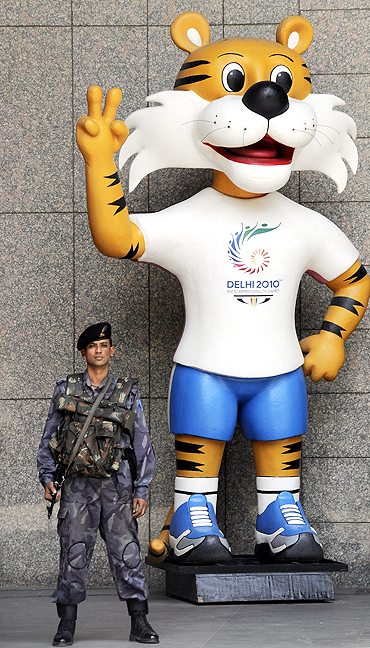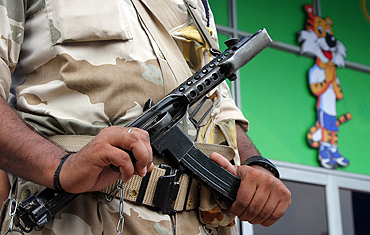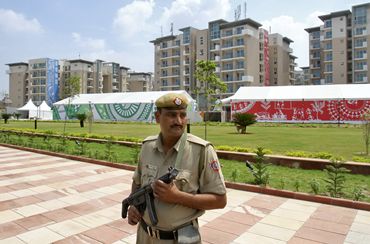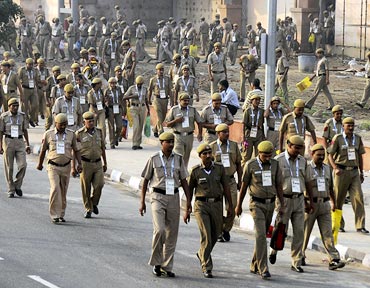
With nearly 100,000 police guarding the Commonwealth Games in India's capital, the biggest threat will be attacks on soft targets, from bombs in markets to a shooting of a tourist on a crowded street.
In recent years India has suffered one of the world's worst tolls from militant attacks -- one study put it only second to Iraq. But there has not been an attack on a "hard" target since gunmen tried to storm India's parliament in 2001.
The attack a week ago that wounded two Taiwanese underscored how hard it will be for security forces in this crowded city of 16 million people. Gunmen on motorbikes shot at a tourist bus in a seemingly random attack on foreigners, before speeding off.
The Games is a showpiece event for India, and an enticing target for groups such as Pakistan-based Lashkar-e-Taiba, which carried out the 2008 Mumbai attacks that killed 166 people.
"Any attack is likely to be opportunistic," the AKE security consultancy company said in a statement.

While India-Pakistan ties are still tense with Pakistani-based militants eyeing ways to infiltrate into India, experts say a more likely scenario would be an attack by local militants using often crude, homemade devices.
Surrounded by what Prime Minister Manmohan Singh has called a "dangerous and unstable neighbourhood", India has suffered bomb attacks on markets, cafes, and shopping streets by suspected homegrown militants backed from Pakistan in recent years.
Since 2000, there have been at least 14 attacks in Delhi in places like markets and train stations, according to a travel advisory by the Australian High Commission, which warns of "a high risk of terrorism" during the Commonwealth Games.
Some athletes have already withdrawn from the Games.
"I wouldn't rule out a spectacular event such as the parliament attack," said Steven Vickers, chairman of FTI-International Risk Ltd. "But the most likely scenario would be a target like a hotel, or a bus."

An attack like Mumbai may provoke India to respond militarily to Pakistan. Vickers said he had been told by top Indian security officials that 12 foreign-inspired plots had been foiled in 2009.
But in India's typical style, the suffocating numbers of police will make a large-scale attack difficult.
"The Games are an attractive but not easy target," said Ajai Sahni, head of the Institute for Conflict Management think tank in New Delhi. "With its sheer numbers, India uses a heavy-handed response. It's very crude but it tends to be successful."
One of the most serious threats, the local Indian Mujahideen (IM) group which is believed to have some support from Pakistan, has suffered from a series of arrests since it was blamed for several attacks on Indian cities in 2008 that killed dozens of people.
Since Mumbai, which showed police outgunned in India's financial hub, intelligence services have received more funding and training. But there are questions about progress.
"This is the biggest test for Indian intelligence since the Mumbai attacks," said Vickers. "But it's not the most efficient organisation in the world."

Some commentators say the massive numbers of police hide serious gaps in training and organisation.
"It is difficult for a lowly police officer to pull up a Mercedes Benz. If someone in India looks like a VIP, they can gain access," said Anthony Moorhouse, CEO of security consultants Dynamiq, which is helping Australian's team with security.
Last minute preparations for the Games has meant that security forces may have cut corners. Police locked down areas only a week before the Oct. 3 opening ceremony.
"The main gap may be lack of the security protocols, dry runs, the sanitation of venues," said Sahni.
Visiting delegations have given few complaints over security.
"It's taking a long time for the people coming in and out of the Games Village," said England spokesperson Caroline Searle. "But it's not a hindrance as it proves that checking is being done tightly."

Many delegations have told athletes not to wear team colours when travelling outside venues. But there are 71 participating countries, and not all following the same security guidelines.
There are more worries about the transport of athletes between venues. One delegation head said his driver, from outside Delhi and poorly trained, got lost on the way to the village and stopped in the middle of a highway to ask for directions.
"These drivers were obviously untrained," said the delegation chief, who asked not to be named. "It didn't inspire confidence."
There may be many more incidents like that.
"You are only as strong as the weakest link and terrorists focus on the weakest link," said Moorhouse. "It could be pretty easy to pick off a foreigner crossing the street."